Endometriosis and Fertility: Navigating the Path to Parenthood
“Struggling to conceive? Endometriosis doesn’t have to define your journey. Learn how to overcome fertility challenges with science and support.”
Introduction
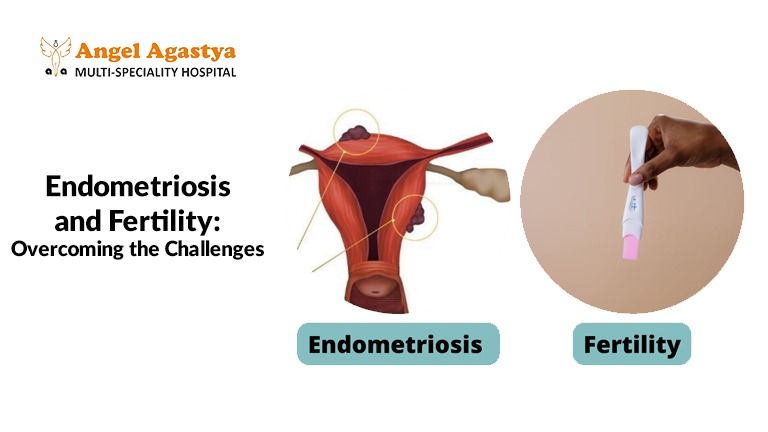
Endometriosis, a chronic condition where tissue similar to the uterine lining (endometrium) grows outside the uterus, has traditionally been associated with women of reproductive age. However, contrary to popular belief, this painful condition doesn’t always end with menopause. While the drop in estrogen levels during menopause typically leads to symptom relief, some women may still experience lingering or even new endometriosis-related symptoms after menopause. This can be particularly relevant for women on hormone replacement therapy (HRT) or those who had severe endometriosis prior to menopause.Understanding how endometriosis and fertility are linked is essential for women navigating this journey.
This blog explores the challenges and provides insights into treatments and strategies to help overcome them.
Understanding Endometriosis and Its Impact on Fertility
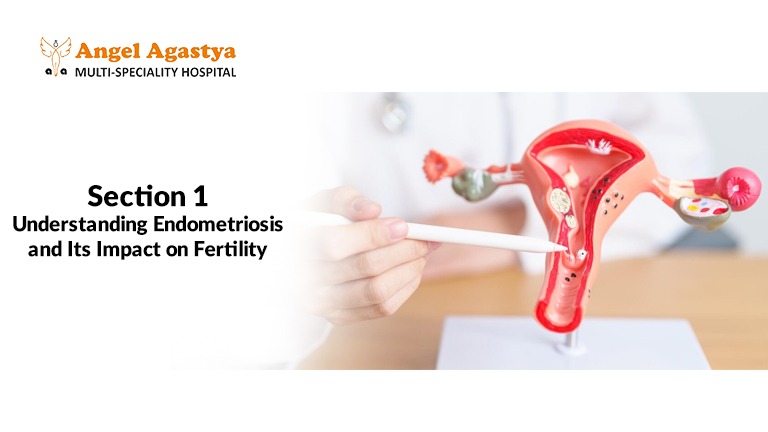
What Is Endometriosis?
Endometriosis occurs when tissue similar to the uterine lining grows outside the uterus, affecting organs like the ovaries and fallopian tubes. This causes pain, inflammation, and scarring, which can lead to fertility challenges. Treatment options aim to manage symptoms, reduce inflammation, and improve fertility outcomes.
How Does Endometriosis Impact Fertility?
The relationship between endometriosis and fertility is complex, and the condition can create several barriers to conception.
- Hormonal Disruptions: Endometriosis causes hormonal imbalances that can interfere with ovulation and implantation, making it harder for a fertilized egg to attach to the uterine wall.
- Pelvic Adhesions and Scarring: Scar tissue, formed due to endometriosis, can block the fallopian tubes or affect the ovaries, preventing proper egg release and fertilization.
- Endometriomas: Ovarian cysts that develop in women with endometriosis can reduce egg quality and ovarian reserve, significantly affecting fertility.
- Chronic Inflammation: The inflammation caused by endometrial tissue outside the uterus can create an inhospitable environment for fertilization, reducing the chances of conception.
These factors contribute to the difficulties women with endometriosis and fertility challenges face, but treatment options are available to improve reproductive health and increase the chances of pregnancy.lammation caused by endometriosis disrupts reproductive processes, directly affecting endometriosis and fertility outcomes.
Diagnosing Endometriosis and Fertility Issues
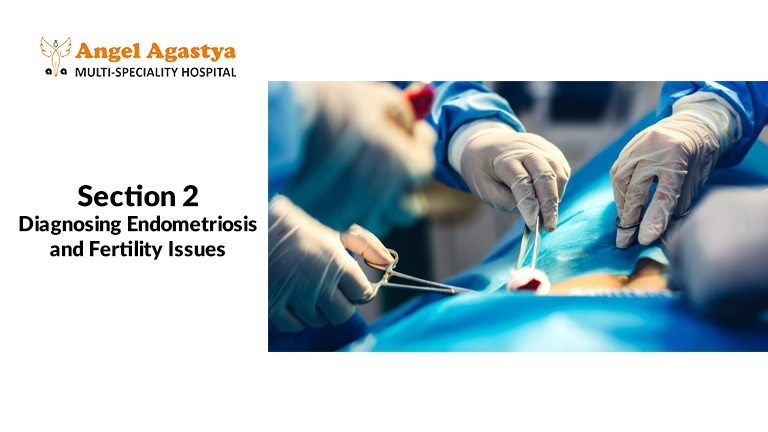
Diagnosis Techniques
Early diagnosis of endometriosis and fertility issues is crucial for effective treatment. The sooner the condition is diagnosed, the better the chances of managing symptoms and improving fertility outcomes. Key diagnostic tools include:
- Blood Tests: While not definitive for diagnosing endometriosis, blood tests can help evaluate inflammation levels and hormone imbalances that may impact endometriosis and fertility.
- Laparoscopy: This surgical procedure is considered the gold standard for diagnosing endometriosis. It allows doctors to directly visualize the pelvic organs and confirm the presence of endometrial tissue outside the uterus.
- Ultrasound: Although ultrasounds cannot definitively diagnose endometriosis, they can identify ovarian cysts known as endometriomas, which are common in women with the condition.
- MRI: Magnetic Resonance Imaging (MRI) provides detailed images that can detect deep infiltrative endometriosis, which may affect fertility by causing damage to pelvic organs.
Early diagnosis leads to better management and increased fertility success.
Medical Treatments to Address Endometriosis and Fertility
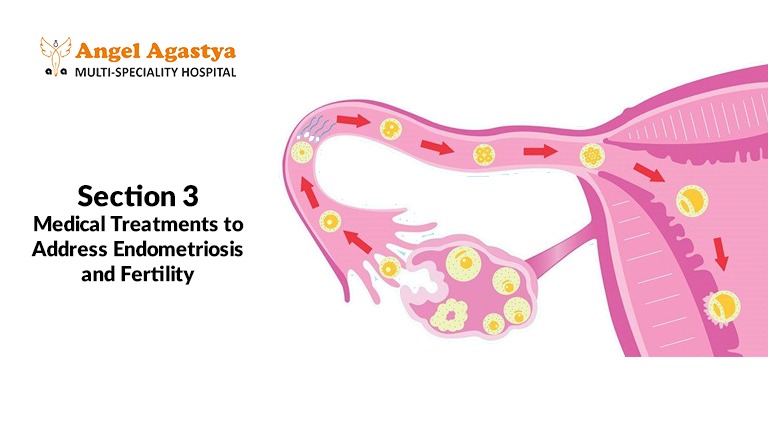
Hormonal Therapy
Hormonal therapy is an essential treatment option for managing endometriosis and its impact on fertility. These treatments help regulate ovulation, reduce inflammation, and improve reproductive health.
- GnRH Agonists: These medications work by suppressing estrogen levels, which in turn limits the growth of endometrial tissue. This suppression reduces pain and enhances fertility outcomes by creating a controlled environment for the ovaries.
- Progestin Therapy: Progestins are a group of hormones that control the symptoms of endometriosis, such as pain and abnormal bleeding. By addressing these symptoms, progestin therapy can indirectly support fertility by maintaining a healthier uterine environment.
For women struggling with endometriosis and fertility challenges, hormonal therapy provides a powerful approach to managing the condition and improving the chances of conception. Exploring these treatment options with a healthcare provider can help in choosing the most effective strategy for achieving parenthood.
Surgical Interventions
Surgical interventions are essential in improving fertility outcomes for women with endometriosis. These procedures can help remove tissue or cysts that impair reproductive function.
- Laparoscopic Surgery: This minimally invasive surgery removes endometrial tissue and adhesions, which can restore normal pelvic anatomy and improve fertility by clearing blocked fallopian tubes and other obstacles.
- Cystectomy: For women with endometriomas (ovarian cysts caused by endometriosis), cystectomy involves removing these cysts to enhance ovarian function. This procedure helps reduce the negative impact of endometriosis on fertility, increasing the chances of conception.
These surgeries offer valuable options for women struggling with infertility due to endometriosis, improving their chances of achieving a successful pregnancy.
Assisted Reproductive Technologies (ART)
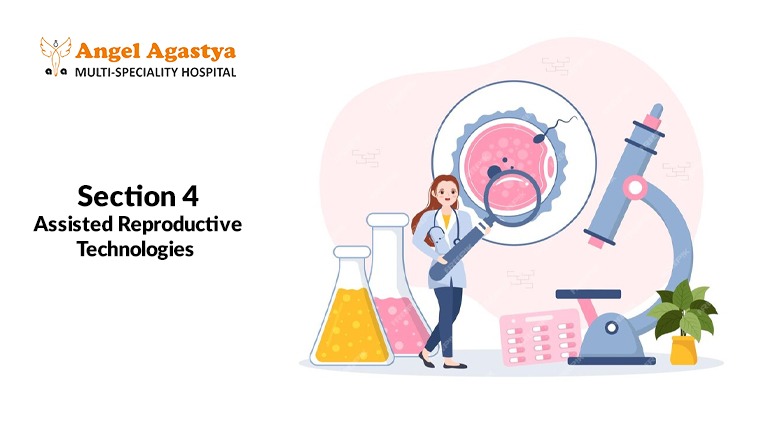
Assisted Reproductive Technologies (ART) can provide significant help for couples struggling with endometriosis and fertility challenges. When natural conception becomes difficult, ART offers effective solutions for achieving parenthood.
IVF (In Vitro Fertilization)
- How IVF Addresses Endometriosis: IVF bypasses many of the fertility barriers caused by endometriosis, such as tubal blockages or poor egg quality. By fertilizing eggs outside the body, IVF increases the chances of conception even when natural reproduction is not possible.
- Pre-Treatment: Suppressing endometriosis with medications prior to IVF treatment can improve success rates. This approach helps reduce the growth of endometrial tissue, creating a more favorable environment for embryo implantation.
IUI (Intrauterine Insemination)
IUI is a less invasive procedure suitable for mild cases of endometriosis and fertility issues. It involves placing sperm directly into the uterus, increasing the chances of successful fertilization.
ART offers hope for couples affected by endometriosis, providing a pathway to parenthood despite fertility challenges.
Lifestyle and Complementary Approaches

While medical treatments play a crucial role, lifestyle modifications can significantly impact endometriosis and fertility outcomes. By focusing on nutrition, exercise, and stress management, women can improve their chances of conception.
Nutrition and Diet
- Anti-Inflammatory Diet: A diet rich in whole foods, fruits, vegetables, and healthy fats can support reproductive health and reduce inflammation. This type of diet is beneficial for managing the symptoms of endometriosis and enhancing fertility.
- Supplements: Nutrients like omega-3 fatty acids and antioxidants can help reduce inflammation and improve fertility. These supplements support overall health while managing endometriosis symptoms.
Exercise and Stress Management
- Regular Exercise: Exercise promotes blood circulation and hormonal balance, both of which are crucial for fertility and managing endometriosis symptoms.
- Stress Reduction: Practices like yoga, meditation, and mindfulness can help reduce stress, which in turn supports hormonal health and improves fertility outcomes.
These lifestyle modifications can help manage endometriosis and fertility challenges, offering natural support to medical treatments.
Complementary Therapies
Acupuncture and herbal treatments may offer additional relief, improving outcomes for women managing endometriosis and fertility challenges.
Emotional Impact and Support
Facing endometriosis and fertility challenges can be emotionally exhausting. Women often experience anxiety, depression, and frustration while trying to conceive. It’s essential to address the emotional impact of endometriosis and fertility struggles, as mental well-being plays a key role in overall health.
- Building a Support System: Joining support groups for women facing endometriosis and fertility issues can provide comfort, encouragement, and a sense of community. Sharing experiences with others who understand can reduce feelings of isolation and offer valuable insights on managing the condition.

2. Counseling: Professional therapy or couples counseling is a crucial step in managing the emotional toll of infertility. Therapy can help individuals and couples navigate the emotional challenges, cope with the stress, and strengthen their relationship during difficult times.
Focusing on emotional health is vital when managing endometriosis and fertility challenges, helping women cope better and improving their overall well-being throughout the fertility journey.
Conclusion
Although endometriosis and fertility issues present significant challenges, advancements in medical science and holistic approaches offer hope for many women. From surgical interventions to Assisted Reproductive Technologies (ART) and lifestyle modifications, there are various options available to improve fertility outcomes. Integrating these approaches with personalized care plans can significantly increase the chances of conception. Working closely with healthcare providers ensures that women have the necessary support and guidance to navigate these challenges effectively. With the right treatment and mindset, many women can overcome the obstacles posed by endometriosis and fertility issues and achieve their dream of parenthood.
Understanding the detailed connection between endometriosis and fertility empowers women to take control of their reproductive health and chase their dream of parenthood.
FAQs
- How does endometriosis affect fertility?
Endometriosis impacts fertility by causing scarring, inflammation, and hormonal imbalances that disrupt ovulation, egg quality, or implantation.
- Can women with endometriosis conceive naturally?
Yes, many women with mild to moderate endometriosis conceive naturally. Severe cases may require medical interventions like surgery or ART.
- Is IVF the best option for fertility issues caused by endometriosis?
IVF is often the most effective option for severe endometriosis-related infertility, especially when natural conception is not successful.
- Can endometriosis return after surgery, and how does it affect fertility?
Endometriosis can recur after surgery, potentially impacting fertility again. Continuous management and medical follow-up are crucial.
- What are the success rates of VBAC for women with endometriosis?
Endometriosis doesn’t usually affect the chances of VBAC directly, but scarring or pelvic adhesions could influence labor progress.
- What lifestyle changes can help improve fertility with endometriosis?
Adopting an anti-inflammatory diet, regular exercise, stress management techniques, and supplements can support reproductive health.
- Are there natural treatments for improving fertility with endometriosis?
Complementary therapies like acupuncture and herbal medicine may help reduce symptoms and improve fertility when used alongside medical treatment.
- How early should I seek help for fertility issues related to endometriosis?
If you’ve been trying to conceive for over 6–12 months without success or experience severe symptoms, consult a fertility specialist early.
- What are the risks of untreated endometriosis for future fertility?
Untreated endometriosis can lead to severe scarring, chronic inflammation, and worsened fertility challenges over time.
- Can managing stress improve fertility outcomes in women with endometriosis?
Yes, reducing stress can positively influence hormonal balance and overall reproductive health, potentially boosting fertility outcomes.
